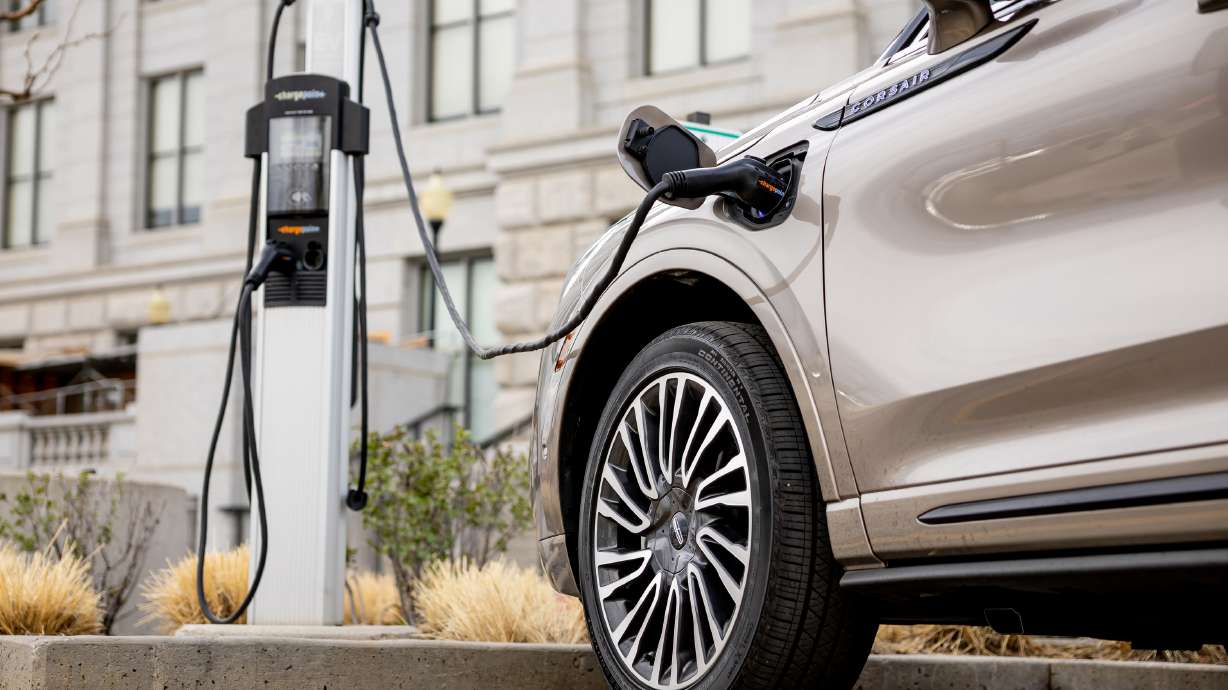Estimated read time: 4-5 minutes
This archived news story is available only for your personal, non-commercial use. Information in the story may be outdated or superseded by additional information. Reading or replaying the story in its archived form does not constitute a republication of the story.
SALT LAKE CITY — Utah Gov. Spencer Cox joined 15 other Republican governors in a letter demanding President Joe Biden "change course" on his administration's "overreaching mandate" to have electric vehicles account for a large share of all vehicles by 2032.
The letter, posted online Monday, calls the plan — first proposed by the Environmental Protection Agency last year and reportedly sent to the White House this month — "unrealistic." The governors suggest American consumers should dictate the electric vehicle market, not the government.
"Instead of using government mandates to drive the vehicle market, allow American consumers to maintain choice in the types of vehicles they choose to drive," the governors wrote. "While we are not opposed to the electric vehicle marketplace, we do have concerns with federal government mandates that penalize retailers and do not reflect the will of the consumer. ... Your mandates are unrealistic, costly and prescriptive solutions that harm American consumers."
The EPA introduced the rule with vehicle emissions standards proposed in April 2023. The measures seek to have electric vehicles account for about 67% of new light-duty vehicle sales and 46% of new medium-duty vehicle sales by 2032.
Michael Regan, the agency's administrator, said at the time, the standards aim to create "critical reductions in dangerous air and climate pollution" while also creating "significant economic benefits like lower fuel and maintenance costs for families." The agency projected the move could cut 10 billion tons of carbon dioxide emissions over the next 30 years.
That proposal has now made it to the White House where Biden could finalize it, Reuters reported Friday.
Electric vehicles are on the rise in Utah, but they still account for a low percentage of all vehicles on the road — at least right now. A little more than 25,500 electric vehicles were registered in Utah by about the start of last year, triple the amount reported in 2020, according to the Utah State Tax Commission. However, last year's total accounted for almost 1% of the over 2.8 million vehicles registered in the state.
That's not so different from the rest of the country. J.D. Power & Associated noted in April that electric vehicles accounted for less than 1% of all vehicles in the U.S.
Cox and the 15 other Republican governors argue the country may not be ready to handle that many electric vehicles in the next decade. In addition to their opposition to the mandate, they say the country must have the right infrastructure to meet the requirements, such as batteries and grid capacity.
The group contends that the U.S. must bolster its "domestic critical minerals industry" to produce enough batteries for the goal and adds there must be enough charging locations for all the EVs. They say conditions make it difficult for car buyers to consider electric vehicles.
"We request you remove your mandate that two out of every three vehicles be electric and instead provide a more realistic approach by allowing the free market to determine the direction and timing for the industry's growth rather than the federal government," the letter concludes.
The governors aren't alone in their opposition.
The National Automobile Dealers Association issued a statement earlier this month urging Congress to support efforts to counter the "overly aggressive" mandates, saying the proposal "ignores real-world consumer demand and goes too far, too fast." An alliance of automakers previously called it "neither reasonable nor achievable in the time frame provided," according to the New York Times.
Others remain hopeful the measure will be enacted. A group of nearly 100 Democratic congressional members signed a letter to Regan last summer supporting the rule change and urging him to finalize it, citing efforts to combat climate change and protect public health.
"We believe the United States should be on a path to eliminating harmful tailpipe pollution from new light-duty and medium-duty vehicles by 2035," it stated. "A transition to a 100% zero-emission vehicles transportation sector is critical to reducing not only (greenhouse gas) emissions, but smog-forming pollution and particulate matter, as well."










